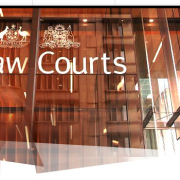Trying to stop courting disaster
Never fail to be appalled by the time-worn old adage that you get the kind of justice you can afford.
Should never be that way but time and time again we see justice dispensed like an insurance company’s write-off car crash assessment. Too much to fix, car’s not worth that much, cut your losses all round. In jurisprudence-speak, just settle.
See it all the time. The cost of defence is going to be too much, cut your costs.
Lots of people happy to do it, too. Bordering on scam. People who might sue for defamation, for instance, for the supposed loss of their reputation among friends and colleagues. They’re happy to forego that sorry loss for filthy lucre instead.
Makes you wonder what a reputation’s worth if you can buy it back with a court order. You can’t, of course.
You can trick up the legal system in other ways, too, if you’re short of cash for legal fees.
Vocal accusations, untested police charges, the rabid court of public opinion and the cesspool of social media are terrific ways of buying the justice you want for next to nothing.
If you’re on the attack, that is. If you’re happy to see your target vilified, harassed, ridiculed, thrown out of work without a fair hearing. If you don’t subscribe to notions of a fair trial, innocent until proven guilty, the rule of law or the annoying notion of justice not only being done but being seen to be done.
If you’re on the defence, it’s a different matter. No amount of money can stave off this kind of out-of-court barrage. You can be done right over no matter regardless of any court outcome.
Which is why the Federal Court is restricting media access to various legal documents. To avoid undesirable consequences by non-parties, viz, reporters.
It means journos can’t report on untested initial applications and claims as soon as they’re lodged with court. They have to wait until the case has its first hearing.
There was a time when sub-judice meant something to reporters. The idea was that you wouldn’t potentially influence any juror, or judge for that matter.
The Federal Court is basically trying to restate that kind of legal protection, by guarding against a level of digital public discussion way beyond what a paper/radio/TV might once have prompted.
Media outlets are filthy on it. Chiefly because, I’d suggest, they’re worried social media has a massive jump and audience on them. They’re claiming the Fed Court has a fundamental misunderstanding of journalism, free speech and democracy.
I’d suggested they’ve got a pretty good idea.
That said, there remain some serious shortcomings to the idea of keeping jurors in the dark about defendants, notably about prior offences and all sorts of evidence that might be deemed inadmissible by our courts.
Jurors are basically treated as dummies. Not smart enough to weigh evidence without stuffing it up. Maybe there’s a case, if you consider how some people react to social media campaigns.
But the one-sided, bias confirmation indoctrination that activists rely on, and web giants happily exploit, is not what justice and the courts are meant to be about.
What we increasingly have these days is pure kangaroo court stuff. Like the old cowboy movie line: Sure, we’ll give you a fair trial, then we’ll hang you.
Jurors need full information, not just some biased information – and definitely not finessed, prejudicial information – if they are to make the same fair and accurate rulings/reports that journalism is obliged to present.
Situation’s pretty simple, really. Anything else and the media’s just embarrassing itself like the targets it too often seeks to lynch with public opprobrium.

